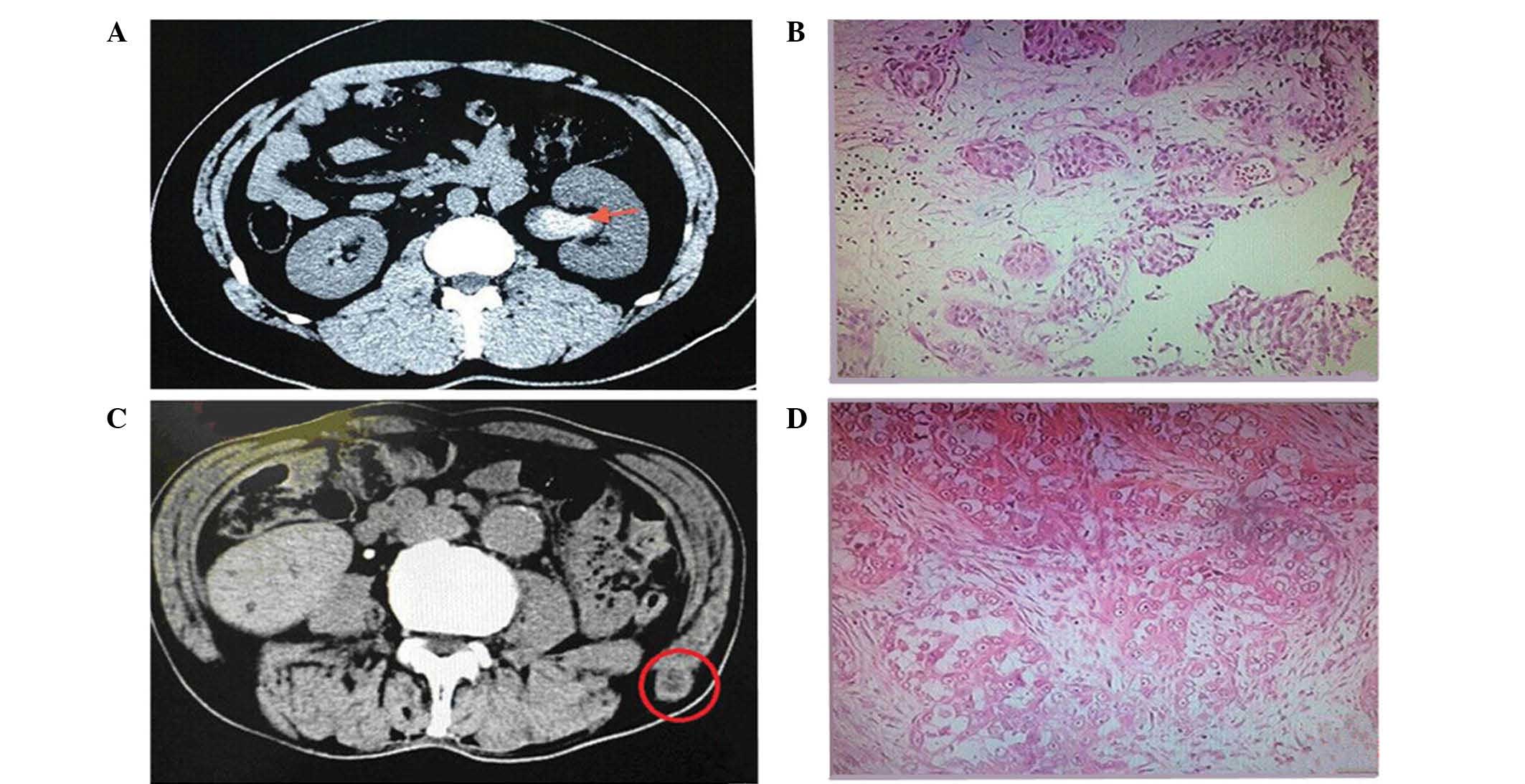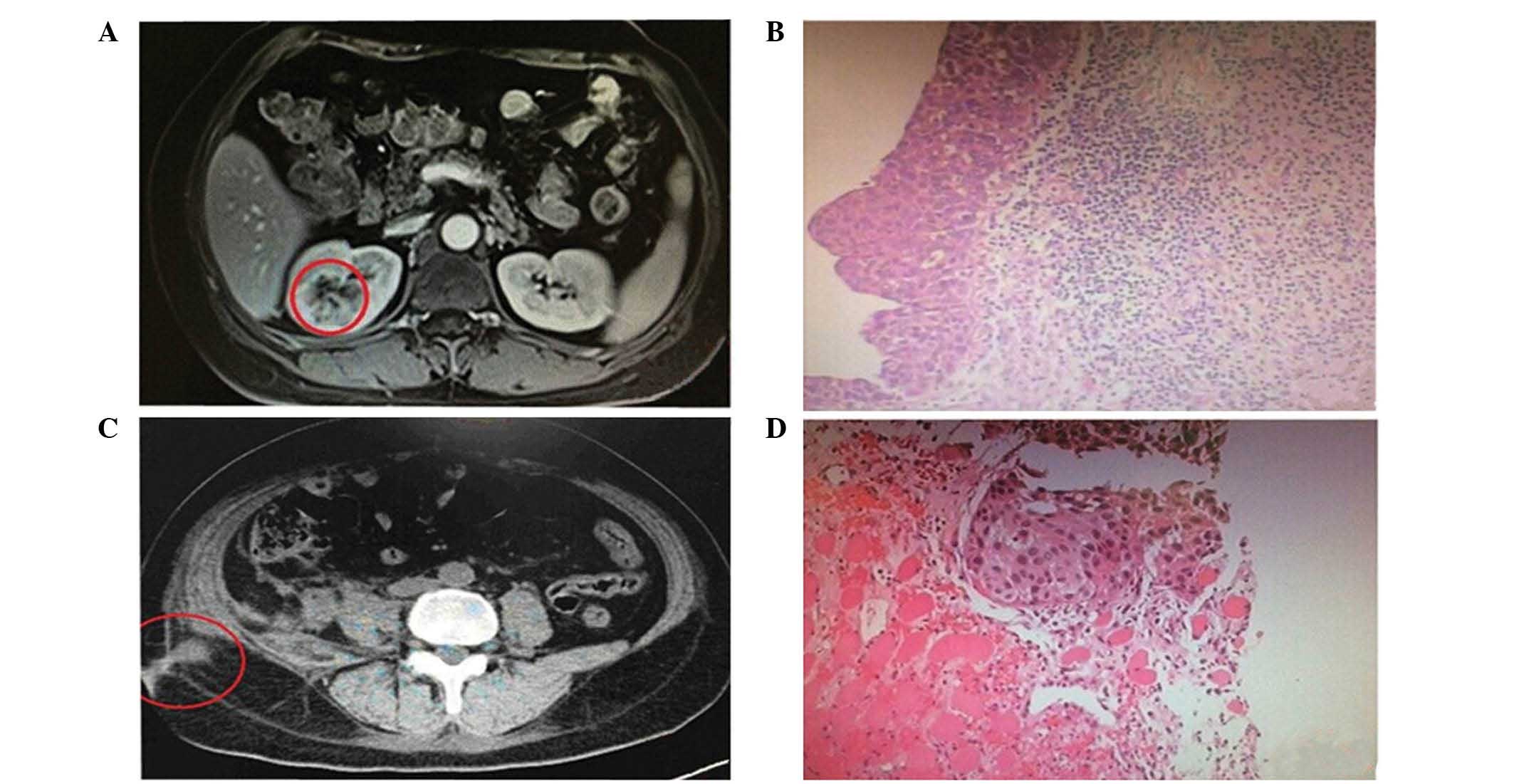|
1
|
Schneider C, Jung A, Reymond MA, Tannapfel
A, Balli J, Franklin ME, Hohenberger W and Köckerling F: Efficacy
of surgical measures in preventing port-site recurrences in a
porcine model. Surg Endosc. 15:121–125. 2001. View Article : Google Scholar : PubMed/NCBI
|
|
2
|
Rassweiler J, Tsivian A, Kumar AV,
Lymberakis C, Schulze M, Seeman O and Frede T: Oncological safety
of laparoscopic surgery for urological malignancy: Experience with
more than 1,000 operations. J Urol. 169:2072–2075. 2003. View Article : Google Scholar : PubMed/NCBI
|
|
3
|
Micali S, Celia A, Bove P, De Stefani S,
Sighinolfi MC, Kavoussi LR and Bianchi G: Tumor seeding in
urological laparoscopy: An international survey. J Urol.
171:2151–2154. 2004. View Article : Google Scholar : PubMed/NCBI
|
|
4
|
Kadi N, Isherwood M, Al-Akraa M and
Williams S: Port-site metastasis after laparoscopic surgery for
urological malignancy: Forgotten or missed. Adv Urol.
2012:6095312012. View Article : Google Scholar : PubMed/NCBI
|
|
5
|
Fentie DD, Barrett PH and Taranger LA:
Metastatic renal cell cancer after laparoscopic radical
nephrectomy: Long-term follow-up. J Endourol. 14:407–411. 2000.
View Article : Google Scholar : PubMed/NCBI
|
|
6
|
Castilho LN, Fugita OE, Mitre AI and Arap
S: Port site tumor recurrences of renal cell carcinoma after
videolaparoscopic radical nephrectomy. J Urol. 165:5192001.
View Article : Google Scholar : PubMed/NCBI
|
|
7
|
Iwamura M, Tsumura H, Matsuda D, Kurosaka
S, Yoshida K and Baba S: Port site recurrence of renal cell
carcinoma following retroperitoneoscopic radical nephrectomy with
manual extraction without using entrapment sac or wound protector.
J Urol. 171:1234–1235. 2004. View Article : Google Scholar : PubMed/NCBI
|
|
8
|
Landman J and Clayman RV: Re: Port site
tumor recurrences of renal cell carcinoma after videolaparoscopic
radical nephrectomy. J Urol. 166:629–630. 2001. View Article : Google Scholar : PubMed/NCBI
|
|
9
|
Chen YT, Yang SS, Hsieh CH and Wang CC:
Hand port-site metastasis of renal-cell carcinoma following
hand-assisted laparoscopic radical nephrectomy: Case report. J
Endourol. 17:771–775. 2003. View Article : Google Scholar : PubMed/NCBI
|
|
10
|
Dhobada S, Patankar S and Gorde V: Case
report: Port-site metastasis after laparoscopic radical nephrectomy
for renal-cell carcinoma. J Endourol. 20:119–122. 2006. View Article : Google Scholar : PubMed/NCBI
|
|
11
|
Castillo OA, Vitagliano G, Díaz M and
Sánchez-Salas R: Port-site metastasis after laparoscopic partial
nephrectomy: Case report and literature review. J Endourol.
21:404–407. 2007. View Article : Google Scholar : PubMed/NCBI
|
|
12
|
Greco F, Wagner S, Reichelt O, Inferrera
A, Lupo A, Hoda RM, Hamza A and Fornara P: Huge isolated port-site
recurrence after laparoscopic partial nephrectomy: A case report.
Eur Urol. 56:737–739. 2009. View Article : Google Scholar : PubMed/NCBI
|
|
13
|
Masterson TA and Russo P: A case of
port-site recurrence and locoregional metastasis after laparoscopic
partial nephrectomy. Nat Clin Pract Urol. 5:345–349.
2008.PubMed/NCBI
|
|
14
|
Lee BR, Tan BJ and Smith AD: Laparoscopic
port site metastases: Incidence, risk factors, and potential
preventive measures. Urology. 65:639–644. 2005. View Article : Google Scholar : PubMed/NCBI
|
|
15
|
Curet MJ: Port site metastases. Am J Surg.
187:705–712. 2004. View Article : Google Scholar : PubMed/NCBI
|
|
16
|
Clayman RV, Kavoussi LR, Soper NJ, Dierks
SM, Merety KS, Darcy MD, Long SR, Roemer FD, Pingleton ED and
Thomson PG: Laparoscopic nephrectomy. N Engl J Med. 324:1370–1371.
1991. View Article : Google Scholar : PubMed/NCBI
|
|
17
|
Stewart GD and Tolley DA: What are the
oncological risks of minimal access surgery for the treatment of
urinary tract cancer? Eur Urol. 46:415–420. 2004. View Article : Google Scholar : PubMed/NCBI
|
|
18
|
Castillo OA and Vitagliano G: Port site
metastasis and tumor seeding in oncologic laparoscopic urology.
Urology. 71:372–378. 2008. View Article : Google Scholar : PubMed/NCBI
|
|
19
|
Highshaw RA, Vakar-Lopez F, Jonasch E,
Yasko AW and Matin SF: Port-site metastasis: the influence of
biology. Eur Urol. 47:357–360. 2005. View Article : Google Scholar : PubMed/NCBI
|
|
20
|
Eng MK, Katz MH, Bernstein AJ, Shikanov S,
Shalhav AL and Zorn KC: Laparoscopic port-site metastasis in
urologic surgery. J Endourol. 22:1581–1585. 2008. View Article : Google Scholar : PubMed/NCBI
|
|
21
|
Fuhrman SA, Lasky LC and Limas C:
Prognostic significance of morphologic parameters in renal cell
carcinoma. Am J Surg Pathol. 6:655–663. 1982. View Article : Google Scholar : PubMed/NCBI
|
|
22
|
Greene FL, Kercher KW, Nelson H, Teigland
CM and Boller AM: Minimal access cancer management. CA Cancer J
Clin. 57:130–146. 2007. View Article : Google Scholar : PubMed/NCBI
|
|
23
|
Rajan P and Turna B: New trends in
minimally invasive urological surgery. Int Braz J Urol. 35:514–520.
2009. View Article : Google Scholar : PubMed/NCBI
|
|
24
|
Yu HY, Friedlander DF, Patel S and Hu JC:
The current status of robotic oncologic surgery. CA Cancer J Clin.
63:45–56. 2013. View Article : Google Scholar : PubMed/NCBI
|
|
25
|
Yu HY, Hevelone ND, Lipsitz SR, Kowalczyk
KJ and Hu JC: Use, costs and comparative effectiveness of robotic
assisted, laparoscopic and open urological surgery. J Urol.
187:1392–1398. 2012. View Article : Google Scholar : PubMed/NCBI
|
|
26
|
Fairey AS, Kassouf W, Estey E, Tanguay S,
Rendon R, Bell D, Izawa J, Chin J, Kapoor A, Matsumoto E, et al:
Comparison of oncological outcomes for open and laparoscopic
radical nephroureterectomy: Results from the Canadian Upper Tract
Collaboration. BJU Int. 112:791–797. 2013. View Article : Google Scholar : PubMed/NCBI
|
|
27
|
Stolla V, Rossi D, Bladou F, Rattier C,
Ayuso D and Serment G: Subcutaneous metastases after coelioscopic
lymphadenectomy for vesical urothelial carcinoma. Eur Urol.
26:342–343. 1994.PubMed/NCBI
|
|
28
|
Wexner SD and Cohen SM: Port site
metastases after laparoscopic colorectal surgery for cure of
malignancy. Br J Surg. 82:295–298. 1995. View Article : Google Scholar : PubMed/NCBI
|
|
29
|
Paolucci V, Schaeff B, Schneider M and
Gutt C: Tumor seeding following laparoscopy: International survey.
World J Surg. 23:989–997. 1999. View Article : Google Scholar : PubMed/NCBI
|
|
30
|
Ramirez PT, Wolf JK and Levenback C:
Laparoscopic port-site metastases: etiology and prevention. Gynecol
Oncol. 91:179–189. 2003. View Article : Google Scholar : PubMed/NCBI
|
|
31
|
Minardi D, Lucarini G, Mazzucchelli R,
Milanese G, Natali D, Galosi AB, Montironi R, Biagini G and
Muzzonigro G: Prognostic role of Fuhrman grade and vascular
endothelial growth factor in pT1a clear cell carcinoma in partial
nephrectomy specimens. J Urol. 174:1208–1212. 2005. View Article : Google Scholar : PubMed/NCBI
|
|
32
|
Stephenson AJ, Chetner MP, Rourke K,
Gleave ME, Signaevsky M, Palmer B, Kuan J, Brock GB and Tanguay S:
Guidelines for the surveillance of localized renal cell carcinoma
based on the patterns of relapse after nephrectomy. J Urol.
172:58–62. 2004. View Article : Google Scholar : PubMed/NCBI
|
|
33
|
Pearlstone DB, Feig BW and Mansfield PF:
Port site recurrences after laparoscopy for malignant disease.
Semin Surg Oncol. 16:307–312. 1999. View Article : Google Scholar : PubMed/NCBI
|
|
34
|
Lee SW, Whelan RL, Southall JC and Bessler
M: Abdominal wound tumor recurrence after open and
laparoscopic-assisted splenectomy in a murine model. Dis Colon
Rectum. 41:824–831. 1998. View Article : Google Scholar : PubMed/NCBI
|
|
35
|
Murthy SM, Goldschmidt RA, Rao LN,
Ammirati M, Buchmann T and Scanlon EF: The influence of surgical
trauma on experimental metastasis. Cancer. 64:2035–2044. 1989.
View Article : Google Scholar : PubMed/NCBI
|
|
36
|
Hofer SO, Molema G, Hermens RA, Wanebo HJ,
Reichner JS and Hoekstra HJ: The effect of surgical wounding on
tumour development. Eur J Surg Oncol. 25:231–243. 1999. View Article : Google Scholar : PubMed/NCBI
|
|
37
|
Aoki Y, Shimura H, Li H, Mizumoto K, Date
K and Tanaka M: A model of port-site metastases of gallbladder
cancer: The influence of peritoneal injury and its repair on
abdominal wall metastases. Surgery. 125:553–559. 1999. View Article : Google Scholar : PubMed/NCBI
|
|
38
|
Vallejo R, Hord ED, Barna SA,
Santiago-Palma J and Ahmed S: Perioperative immunosuppression in
cancer patients. J Environ Pathol Toxicol Oncol. 22:139–146. 2003.
View Article : Google Scholar : PubMed/NCBI
|
|
39
|
Snyder GL and Greenberg S: Effect of
anaesthetic technique and other perioperative factors on cancer
recurrence. Br J Anaesth. 105:106–115. 2010. View Article : Google Scholar : PubMed/NCBI
|
|
40
|
Eggermont AM, Steller EP and Sugarbaker
PH: Laparotomy enhances intraperitoneal tumor growth and abrogates
the antitumor effects of interleukin-2 and lymphokine-activated
killer cells. Surgery. 102:71–78. 1987.PubMed/NCBI
|
|
41
|
Wakim-Fleming J and Mullen KD: Long-term
management of alcoholic liver disease. Clin Liver Dis. 9:135–149.
2005. View Article : Google Scholar : PubMed/NCBI
|
|
42
|
Contin C, Pitard V, Delmas Y, Pelletier N,
Defrance T, Moreau JF, Merville P and Déchanet-Merville J:
Potential role of soluble CD40 in the humoral immune response
impairment of uraemic patients. Immunology. 110:131–140. 2003.
View Article : Google Scholar : PubMed/NCBI
|
|
43
|
Kazemier G, Bonjer HJ, Berends FJ and
Lange JF: Port site metastases after laparoscopic colorectal
surgery for cure of malignancy. Br J Surg. 82:1141–1142. 1995.
View Article : Google Scholar : PubMed/NCBI
|
|
44
|
Jacobi CA, Sabat R, Böhm B, Zieren HU,
Volk HD and Müller JM: Pneumoperitoneum with carbon dioxide
stimulates growth of malignant colonic cells. Surgery. 121:72–78.
1997. View Article : Google Scholar : PubMed/NCBI
|
|
45
|
Gutt CN, Riemer V, Kim ZG, Jacobi CA,
Paolucci V and Lorenz M: Impact of laparoscopic colonic resection
on tumour growth and spread in an experimental model. Br J Surg.
86:1180–1184. 1999. View Article : Google Scholar : PubMed/NCBI
|
|
46
|
Lee SW, Gleason NR, Bessler M and Whelan
RL: Port site tumor recurrence rates in a murine model of
laparoscopic splenectomy decreased with increased experience. Surg
Endosc. 14:805–811. 2000. View Article : Google Scholar : PubMed/NCBI
|
|
47
|
Lee SW, Southall J, Allendorf J, Bessler M
and Whelan RL: Traumatic handling of the tumor independent of
pneumoperitoneum increases port site implantation rate of colon
cancer in a murine model. Surg Endosc. 12:828–834. 1998. View Article : Google Scholar : PubMed/NCBI
|
|
48
|
Wittich P, Mearadji A, Marquet RL and
Bonjer HJ: Irrigation of port sites: Prevention of port site
metastases? J Laparoendosc Adv Surg Tech A. 14:125–129. 2004.
View Article : Google Scholar : PubMed/NCBI
|
|
49
|
Iavazzo C and Gkegkes ID: Port-site
metastases in patients with gynecological cancer after
robot-assisted operations. Arch Gynecol Obstet. 292:263–269. 2015.
View Article : Google Scholar : PubMed/NCBI
|

















